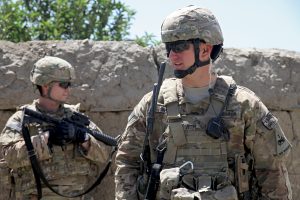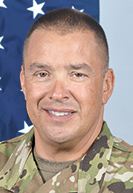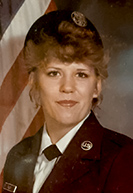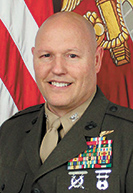Subscriber Benefit
As a subscriber you can listen to articles at work, in the car, or while you work out. Subscribe NowThe law is a service profession, one lawyers often enter into with big dreams of changing the world. For some lawyers, though, the work of changing the world begins not in law school, but in the military.
Across Indiana, legions of men and women who practice law began their careers as members of the U.S. Armed Forces. A search of law firm websites and attorney biographies finds representation from all branches of the military, various ranks and global deployments.
In honor of Veterans Day 2020, Indiana Lawyer reached out to servicemen and women across Indiana from several branches of the U.S. Armed Forces. Here are the stories of four legal professionals who shared their experiences.
Phil Smith: U.S. Army
Phil Smith did not intend to go to West Point. As he was preparing to leave high school, his goal was simply to play college football.
In fact, Smith had already committed to a football program when he agreed to tour West Point. He and his dad decided to go on the tour merely as a chance to see the storied institution. Ultimately, it was the institution’s storied history that prompted Smith to change his mind.

Upon his graduation with a degree in American legal studies and environmental engineering, Smith began his five-year term of service. He spent a year working as a graduate assistant at his alma mater before completing his officer’s training and getting deployed to Afghanistan, where he served as a combat platoon leader.
Returning home in 2012, Smith rose to the rank of captain before getting out of the Army in 2016. He then took a career step that had been on his radar since a high school job shadowing experience: enrolling in law school.
Eventually, Smith’s career took him to Rothberg Logan Warsco LLP in Fort Wayne, where he practices business law. Though the connection between military service and business law might not be immediately obvious, the two fit together for Smith.
“That’s the American spirit — building a company, building something with their own hands,” Smith said, describing his clients’ work. “I can’t do that personally, but being a business attorney, I love getting to help them do that.”
Though his six years in service did require sacrifice, there’s one thing Smith didn’t have to give up — at West Point, he got to play football.
Judge Doug Fahl: Indiana Army National Guard

As a young man fresh out of college, Doug Fahl, now a judge of the Whitley Superior Court, joined the Army to pay down his student loans. His goal was to take advantage of a special loan repayment program that would allow him to pay down his debt and enroll in law school.
“Never in a million years did I think that 30 years later I’d still be in,” he said.
Fahl stayed in the Reserves during law school, then transferred into the infantry upon graduation and eventually secured a Judge Advocate General commission. His commission would ultimately lead to two deployments: one to Iraq in 2008, and one eight years later to Guantanamo Bay, Cuba.
Now, Fahl is preparing for a new position: the state’s first Indiana National Guard military judge. Accepted into an exclusive program at the military judges’ school in Charlottesville, Virginia, Fahl secured a training spot open to only four National Guard JAGS.
With his training complete, Fahl’s role will be to preside over military criminal cases that fall outside the jurisdiction of the local prosecutor. He gave the example of disrespecting an officer — not a crime by traditional legal standards, but certainly a violation of the Uniform Code of Military Justice.
The judge’s military expertise also transfers easily to his work on the bench, where he runs Whitley County’s Veterans Treatment Court. He knows what it’s like to be a soldier — he’s been shot at, though thankfully never shot — so he can relate to the struggles his participants face.
But the real key to his success as both a judge and a soldier, Fahl said, is the support he gets from his local community.
“I had to leave my job as a judge for a year to deploy, but the community was supportive and stood behind me. They voted me back into office while I was deployed,” he said. “I haven’t had to say, ‘I’m going to be a judge or I’m going to be in the military.’”
Polli Pollem: U.S. Air Force

At 17, Polli Pollem was a young woman doing what was then thought to be a man’s job: working as a jet engine mechanic in the U.S. Air Force. The year was 1980, and it had been only two years since the Air Force had introduced a woman into that job for the first time.
Resisting efforts to “put her behind a typewriter,” Pollem remained a mechanic, spending three years stationed in Okinawa, Japan. When she returned to the states, she became an instructor in the jet engine school and again went overseas, this time to teach, landing in South Korea in time for the 1988 Olympics.
To this day, instructing other professionals who interact with military veterans remains one of Pollem’s favorite parts of her job as the director of the Military Assistance Project for Indiana Legal Services. Her other favorite part is the satisfaction she feels when she helps win a legal victory for other veterans who weren’t as lucky as her.
“I grew up very poor. I was the poster child for how poor people get out of the ghetto. If I hadn’t joined, I don’t know what would’ve happened,” Pollem said.
“So I relate to these people,” she said of her clients. “We’re all just working. Some of them are just one paycheck away from not being able to take care of themselves. So I guess I relate to them culturally.”
For Pollem’s clients, a victory might be an upgrade from a less-than-honorable discharge. Or maybe she helps a victim of combat sexual trauma receive benefits. Often, victims of that trauma are more comfortable with Pollem because of her military background.
Pollem knows her time in the Air Force changes how her clients look at her — but that’s not necessarily a bad thing.
“In some cases where they’re being difficult, I can turn on the captain,” she said with a laugh.
But at the end of the day, Pollem knows that her brothers and sisters in arms don’t want to be difficult, they just want to get back on their feet.
“I rarely run into a veteran with that attitude of ‘I want a handout,’” she said. “It’s always a hand up.”
Judge James Sweeney: U.S. Marines

As a lifelong athlete, Judge James Sweeney of the Southern Indiana District Court decided he’d go to medical school when he left active duty in the U.S. Marine Corps. The idea, he recalled, was to earn an M.D. and become a team doctor.
Sweeney hadn’t intended to leave active duty in 1992, but family concerns drew him back home. Then, as he began his summer school prerequisites for medical school, the now-judge came to realize that medicine might not be for him.
Instead, Sweeney landed at Notre Dame Law School while remaining a member of the Reserves. He would then move through two clerkships, another year on active duty and a patent law practice at Barnes & Thornburg before taking the bench in 2018.
But Sweeney was introduced to the concept of administering justice at the U.S. Naval Academy in Annapolis, Maryland, where he learned about the Uniform Code of Military Justice and how he would be charged with implementing it. For example, commanding officers can be tasked with overseeing proceedings that lead to “non-judicial punishments” for violations of the Uniform Code. A non-judicial punishment is not as serious as a trial by court-martial, which is a judicial proceeding.
But more than that, Sweeney said his time on active duty gave him an appreciation for the rule of law that he now brings to the Southern Indiana District Court bench. He’s traveled to countries where civil rights don’t exist, and he’s seen what it’s like to live under martial law.
“You learn how much better is it to have that rule of law, to have that right of adjudication of those protections,” he said.
Though becoming a lawyer wasn’t a long-term goal for Sweeney, serving as a judge is in line with what he’s always wanted to do: serve his country. Serving as a Marine, the judge got to know others who came from backgrounds different from his own, and he saw how those backgrounds came together for a common mission.
Similarly, “When you’re advocating for a party that has a different goal and outlook than the other, you have to be able to listen to all sides to advocate as best as you can,” he said.•
Please enable JavaScript to view this content.

